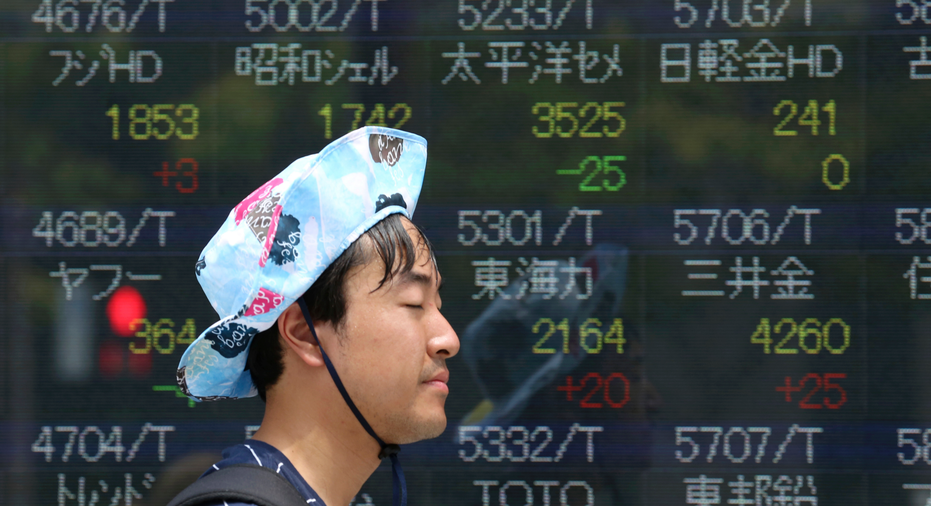Asian stocks fall, weighed by tensions over US trade tariffs

SINGAPORE – Asian markets fell on Tuesday as mounting tensions over U.S. tariffs overshadowed data suggesting global growth was still on track.
KEEPING SCORE: South Korea's Kospi lost 0.2 percent to 2,297.64 and Hong Kong's Hang Seng lost 1.0 percent to 28,247.53 in morning trading. The Shanghai Composite index tumbled 1.0 percent to 2,785.68. Australia's S&P/ASX 200 dropped 0.5 percent to 6,213.30. Japan's benchmark Nikkei 225 bucked the regional trend, gaining 0.4 percent to 22,692.82. Shares fell in Taiwan and Southeast Asia.
WALL STREET: Most U.S indexes closed lower on Monday as investors bought banks but sold most other types of stocks, including health care and technology companies. The S&P 500 index fell 0.1 percent to 2,798.43. The Dow Jones Industrial Average added 0.2 percent to 25,064.36 as Goldman Sachs, JPMorgan Chase, and Boeing climbed. The Nasdaq composite lost 0.3 percent to 7,805.72. The Russell 2000 index of smaller-company stocks shed 0.5 percent to 1,678.54.
TARIFF CHALLENGES: On Monday, the Trump administration brought cases against China, the European Union, Canada, Mexico and Turkey at the World Trade Organization for retaliating against American tariffs on imported steel and aluminum. The U.S. has imposed tariffs of 25 percent on steel and 10 percent on aluminum on the grounds that the imported metals pose a threat to its national security. In response, the countries have counterpunched with taxes on more than $24 billion worth of U.S. exports. U.S. Trade Representative Robert Lighthizer said their retaliation violates WTO rules. If the WTO agrees, it would assess the damage and calculate the tariffs that the United States would be entitled to impose in response — retaliation for the retaliation. But WTO proceedings can last years. Earlier in the day, China said it had filed a WTO challenge to Trump's proposal for a tariff hike on $200 billion of Chinese goods.
GLOBAL GROWTH: The International Monetary Fund is keeping its forecast for global economic growth unchanged at 3.9 percent this year despite worries about rising trade tensions and higher oil prices. It still expects tax cuts to lift U.S. economic growth to 2.9 percent this year, up from 2.3 percent in 2017, but downgraded the outlook for Europe and Japan.
ANALYST'S TAKE: "The recovery for equity markets takes a breather with the earnings optimism coming under question and a reminder of the concerns over trade tensions. A packed day nevertheless lies ahead which would be drivers aplenty for equities," Jingyi Pan of IG said in a commentary.
NETFLIX: Netflix is adding subscribers at a slower pace than envisioned, renewing fears that its growth may sputter as the video streaming service tries to fend off fiercer competition. The company added 5.1 million subscribers in the April-June period, more than 1 million below what management had believed it could. Monday's numbers marked the first time in a more than a year that Netflix hadn't exceeded its subscriber growth projection. Its shares plunged 13.2 percent in aftermarket trading.
ENERGY: Oil prices recovered after falling more than 4 percent on official suggestions that the U.S. will take a softer stance on countries that import oil from Iran, once sanctions on its energy sector go back into effect in November. Benchmark U.S. crude added 5 cents to $68.11 per barrel in electronic trading on the New York Mercantile Exchange. The contract fell 4.2 percent to $68.06 in New York on Monday. Brent crude, used to price international oils, gained 49 cents to $72.33 per barrel.
CURRENCIES: The dollar rose to 112.41 yen from 112.30 yen late Monday. The euro edged lower to $1.1710 from $1.1714.



















